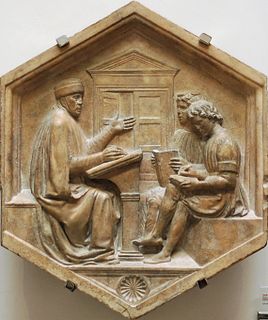
The word lituus originally meant a curved augural staff, or a curved war-trumpet in the ancient Latin language. This Latin word continued in use through the 18th century as an alternative to the vernacular names of various musical instruments.

Priscianus Caesariensis, commonly known as Priscian, was a Latin grammarian and the author of the Institutes of Grammar, which was the standard textbook for the study of Latin during the Middle Ages. It also provided the raw material for the field of speculative grammar.
Andrea Gabrieli was an Italian composer and organist of the late Renaissance. The uncle of the somewhat more famous Giovanni Gabrieli, he was the first internationally renowned member of the Venetian School of composers, and was extremely influential in spreading the Venetian style in Italy as well as in Germany.
The year 1657 in science and technology involved some significant events.

Gaspard Bauhin or Caspar Bauhin, was a Swiss botanist whose Pinax theatri botanici (1623) described thousands of plants and classified them in a manner that draws comparisons to the later binomial nomenclature of Linnaeus. He was a disciple of the famous Italian physician Girolamo Mercuriale and he also worked on human anatomical nomenclature.

Jehan le Taintenier or Jean Teinturier, Latinised in Johannes Tinctoris was a Renaissance composer and music theorist from the Low Countries. He is perhaps the most significant European writer on music since Guido of Arezzo.

Mathias de l'Obel, Mathias de Lobel or Matthaeus Lobelius was a Flemish physician and plant enthusiast who was born in Lille, Flanders, in what is now Hauts-de-France, France, and died at Highgate, London, England. Graduating in medicine from the University of Montpellier in 1565 he practiced medicine in the low countries and England, including positions as personal physicians to two monarchs. A member of the sixteenth century Flemish School of Botany, he wrote a series of major treatises on plants in both Latin and Dutch. He was the first botanist to appreciate the distinction between monocotyledons and dicotyledons. The Lobelia plant is named after him.

Hugues Doneau, commonly referred also by the Latin form Hugo Donellus, was a French law professor and one of the leading representatives of French legal humanism.

Zuffolo (also chiufolo, ciufolo) is an Italian fipple flute. First described in the 14th century, it has a rear thumb-hole, two front finger-holes, and a conical bore. It is approximately 8 cm in length and has a range of over two octaves, from B3 to C6 (Marcuse 1975c). A larger instrument of the same name, with a lowest note of C5 appeared in the early 17th century (Fuller-Maitland, Baines, and Térey-Smith 2001).
David Hume or Home of Godscroft (1558–1629) was a Scottish historian and political theorist, poet and controversialist, a major intellectual figure in Jacobean Scotland. It has been said that "Hume marks the culmination of the Scottish humanist tradition."
Anselm Haverkamp is a German-American professor of literature and philosophy.
Johann Jakob Bethmann was a German merchant and shipowner.
Bethmann Bank AG is a German private bank headquartered in Frankfurt am Main. It is a subsidiary of the Dutch ABN AMRO Bank N.V. and was the product of a merger between the historical German banks Delbrück, Bethmann and Maffei under the umbrella of the renowned Dutch ABN AMRO Bank. LGT Bank Deutschland joined this group in 2011. Bethmann Bank acquired the German private banking activities of Credit Suisse in December 2013. The acquisition positions Bethmann Bank, ABN AMRO’s private bank in Germany, as the third largest private bank in Germany.

Robert Hues was an English mathematician and geographer. He attended St. Mary Hall at Oxford, and graduated in 1578. Hues became interested in geography and mathematics, and studied navigation at a school set up by Walter Raleigh. During a trip to Newfoundland, he made observations which caused him to doubt the accepted published values for variations of the compass. Between 1586 and 1588, Hues travelled with Thomas Cavendish on a circumnavigation of the globe, performing astronomical observations and taking the latitudes of places they visited. Beginning in August 1591, Hues and Cavendish again set out on another circumnavigation of the globe. During the voyage, Hues made astronomical observations in the South Atlantic, and continued his observations of the variation of the compass at various latitudes and at the Equator. Cavendish died on the journey in 1592, and Hues returned to England the following year.
Ludwig Guttenbrunn was an Austrian artist who worked in the latter part of the 18th century and early 19th century. He specialized in portraiture and history painting.

Hans-Ulrich Treichel is a Germanist, novelist and poet. His earliest published books were collections of poetry, but prose writing has become a larger part of his output since the critical and commercial success of his first novel Der Verlorene. Treichel has also worked as an opera librettist, most prominently in collaboration with the composer Hans Werner Henze.

F. W. Bernstein was a German poet, cartoonist, satirist, and academic. He worked for the satirical biweekly pardon. After teaching at schools, he was professor of caricature and comics at the Berlin Academy of the Arts from 1984 to 1999. He was one of the founding members of the Neue Frankfurter Schule, which published the satirical magazine Titanic.

Reiner Stach is a German author, biographer of Franz Kafka, publisher, and publicist. Stach lives and works as a freelancer in Berlin.
The commandant was the chief commanding position within the SS service of a Nazi concentration camp. He held the highest rank and was the most important member of the camp unit. The commandant directed the camp headquarters and was responsible for all issues of the nazi concentration camp. The regulations of his duties and responsibilities came from the Concentration Camps Inspectorate (CCI).
Wolfgang Franz was a German mathematician who specialized in topology particularly in 3-manifolds, which he generalized to higher dimensions. He is known for the Reidemeister–Franz torsion. He also made important contributions to the theory of lens spaces.












